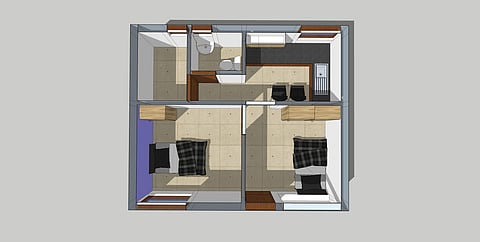

A team at the Anant National University in Gujarat has curated an implementation plan to tackle India's biggest battle which is the scarcity of organised COVID-19 recovery spaces. They are equipped to transform a vacant building anywhere in India into a Coronavirus recovery facility at absolutely zero cost. The plan has been submitted to the Prime Minister's office and health officials. The plan includes layouts for different types of spaces along with divisions for the following categories of patients — asymptomatic but tested positive for COVID-19, patients with mild symptoms, patients with moderate symptoms, patients with severe symptoms.
The Centre for Sustainability at Anant National University has gone one step ahead and curated a 360-degree-approach that will cater to the issue at hand, prove to be beneficial for the ones who opt to give out their space and will be executed with no financial implications at this point to the government. The transformation of any vacant space into becoming a COVID-19 recovery facility can be implemented free of cost in 3-5 days by the institute. "We had been working on this idea much before the pandemic struck. We were already working on vacant houses in India as a project from the Centre for Sustainability in the past years. We were generating primary data, conducted surveys in Ahmedabad and Mumbai and looked for the reason behind so much infrastructure lying vacant and what can be done with these houses, how it can be leveraged. Then the provost of the university suggested that we convert them into wards and create solutions related to Coronavirus," says Dr Miniya Chatterjee, who is spearheading this initiative.
She tells us about the buildings that the team is targetting to convert. The easiest to work on are halls, marriage hall, community hall as the wiring for vacuum, monitoring, oxygen supply, ventilators. It's easier in an open space like in China they have taken up open spaces such as stadiums to convert them into wards. These are also typically government-owned or community-owned and thus easier to acquire. Then comes the office or commercial spaces which are vacant. The team has plans to provide financial incentives to the builder. "We suggested we give TDR credits to the builder if a builder wants to build somewhere that space will have a fee to build more than just a ground floor. They buy TDR for the extra space where they want to construct, for the next project the TDR can be given free to the builder for the equivalent value of the space that he is giving us now. It's quite lucrative for them. And the builder is incentivised to build again later," adds Dr Miniya.
Speaking about the entire process, Dr Miniya adds, "We had initially thought of only isolation wards, but then looking at the intensity of the virus we thought of making it into hospitals, equipped with machines and facilities for treatment. We got vendors on board, created a Public-Private-Partnership model so that private entities have some financial profit and in a way that the government doesn't have to pay for any of it now. We made layouts, made plans, cost per bed, we consulted doctors, experts, the COVID task force in Gujarat. And then we got in touch with a consulting company that sets up hospitals so that we could be sure about the equipment, all other necessities, where to get raw materials. Our idea was to put together a plug and play model, which can be replicated at low costs. Now what is happening mostly is Adhoc, some take up vacant spaces like parking lots, restaurants and end up spending a lot more running here and there."
Currently, the team has begun work in Kerala and they are bearing the entire cost of setting it up. "The staff is not ours, we are mainly depending on the Government to provide that. This whole model is such that we are partnering with the government because of its large scale. Now we are focusing on rural areas in Kerala where there are no hospitals or medical facilities so that immediate care can be provided. Later we want to set up more in Mumbai and Delhi," she concludes.
